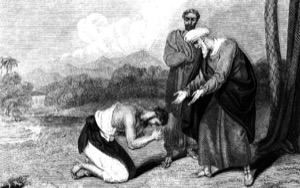
As a progressive Christian, I believe there are many names for God and many ways to a loving God; this article reflects one of those ways. Take from here what works for you. Celebrate life with joy and peace!
The parable of the prodigal son is familiar to many of us, even if you didn’t grow up in church. Jesus used parables as a way of story-telling. The definition of a parable is “a simple story used to illustrate a moral or spiritual lesson, as told by Jesus in the Gospels.” With the most common synonyms for a parable being “allegory or fable.”
The parable of the prodigal is an attempt to get us to change how we think about God, and once we change that thought, it may just lead to powerful changes in our lives. The parable of the prodigal challenges us to rethink our understanding of divine Love, so that we can trust God’s love more completely and allow it to bless our lives even more abundantly.
Prodigal means “recklessly, extravagantly wasteful.” Now, our first thought is to think of the younger child as being wasteful because the child goes through the inheritance so quickly. But, think about it, the parents are also extravagant, giving the child the entire inheritance so young, and when the inheritance is gone, without hesitation, welcoming the child back to the rich and luxurious household and then giving more gifts and throwing more parties on top of it.
Now, I want you to see something here. The parents in this parable are bountifully, wastefully, extravagantly, generous, giving everything without expecting anything in return. Maybe it’s the story of a prodigal God!
The difference between the prodigal child and the prodigal parents is that the prodigal child spends all the money on selfish pleasures, and whatever happiness all of that brings at the moment cannot, and will not, last.
The parents, symbolizing God, generously spend their money on helping, blessing, uplifting and affirming others. And the joy that kind of giving generates never runs out. God’s “givingness” will never run out.
Theologian, Rev. Durrell Watkins, says that the story of the prodigal not only shows the short-sightedness of the younger child, and the unconditional love and generosity of the parents who represent God, but it also shows the flawed attitude of the older child.
What is the older child doing when the young prodigal returns home? The older child sits in judgment of the younger sibling, feeling superior, more self-righteous and more entitled to the love and largesse of the family. But true love doesn’t work that way. It isn’t earned.
True love can’t be earned, and it can’t be lost. It’s freely given. And the people who need it most, may seem to deserve it least, but all that divine Love encompasses is offered to everyone, always.
In this parable, both sons need to learn that life has plenty for them both. The younger one learns that he can’t lose God’s love no matter what he has done. The older one learns that he doesn’t need to earn God’s love and he doesn’t need to be jealous that others receive it as well even if he thinks they are underserving. The truth is there is plenty of love for everyone. Divine Love never runs out!
Now what about the father in this parable? He is more understanding, more patient, more forgiving and more generous than almost any real parent could be. But isn’t that the point? In our human relationships we find ourselves needing to set limits to protect ourselves or others, needing to hold people accountable so they can’t become abusive or unfair or finding ourselves trying to avoid enabling destructive behavior.
But those are the limits of the human experience. Divine Love has no such limitations. I like how Dr. Watkins put it, “God doesn’t get caught up in our dramas. God doesn’t see through the lens of limitation, fear, greed or selfishness.” That is not divine Love.
God sees only the beauty God created. You are fabulous, unique, strong, amazing, and wonderful! ‘Cause God makes no mistakes!
And as the Apostle Paul wrote in Romans 8, nothing can separate us from the Love of God, or we could say it this way, nothing can separate us from the Love that God is! Nothing!
God isn’t a loving individual. God is Love itself, and divine Love is higher and greater than any love we have known or can even imagine. I’ve heard people talk in MCC Conferences of how sometimes people who have had a bad experience of religion will say they don’t believe in God. Then one preacher responded, “When they ask me how I can believe in God, I usually ask them, ‘Do you believe in hope? Do you believe in beauty, in love, in peace, in compassion?’ Of course they do. That’s when she tells them, “I choose to call that God, and you don’t.”
Sometimes when we speak of the unconditional, all-inclusive love of an omnipresent God, that divine Love that will not let us go, people get scared. Sometimes they resist such good news. They think, where’s the catch? There is no catch, there is no condition. God says to you, “Come just as you are.”
The story of the prodigal is about how we can trust God to be unconditionally present to us. You can run, but you can’t hide! God’s love is ever-ready, waiting for us, looking for us, celebrating us.
Religion isn’t meant to be fire insurance for the next life. Religion isn’t meant to instill guilt or shame or fear. Religion, at its best, reminds us that God is love and as perfect, eternal Love, God would never, could never and will never let us go!











